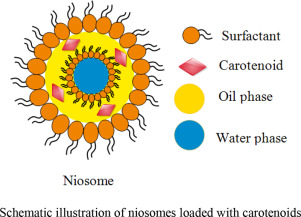当前位置:
X-MOL 学术
›
Adv. Colloid Interface Sci.
›
论文详情
Our official English website, www.x-mol.net, welcomes your
feedback! (Note: you will need to create a separate account there.)
Carotenoid-loaded nanocarriers: A comprehensive review.
Advances in Colloid and Interface Science ( IF 15.9 ) Pub Date : 2019-11-07 , DOI: 10.1016/j.cis.2019.102048 Abdur Rehman 1 , Qunyi Tong 1 , Seid Mahdi Jafari 2 , Elham Assadpour 2 , Qayyum Shehzad 3 , Rana Muhammad Aadil 4 , Muhamad Waheed Iqbal 3 , Marwan M A Rashed 5 , Bilal Sajid Mushtaq 3 , Waqas Ashraf 3
Advances in Colloid and Interface Science ( IF 15.9 ) Pub Date : 2019-11-07 , DOI: 10.1016/j.cis.2019.102048 Abdur Rehman 1 , Qunyi Tong 1 , Seid Mahdi Jafari 2 , Elham Assadpour 2 , Qayyum Shehzad 3 , Rana Muhammad Aadil 4 , Muhamad Waheed Iqbal 3 , Marwan M A Rashed 5 , Bilal Sajid Mushtaq 3 , Waqas Ashraf 3
Affiliation

|
Carotenoids retain plenty of health benefits and attracting much attention recently, but they have less resistance to processing stresses, easily oxidized and chemically unstable. Additionally, their application in food and pharmaceuticals are restricted due to some limitations such as poor bioavailability, less solubility and quick release. Nanoencapsulation techniques can be used to protect the carotenoids and to uphold their original characteristics during processing, storage and digestion, improve their physiochemical properties and enhance their health promoting effects. The importance of nanocarriers in foods and pharmaceuticals cannot be denied. This review comprehensively covers recent advances in nanoencapsulation of carotenoids with biopolymeric nanocarriers (polysaccharides and proteins), and lipid-based nanocarriers, their functionalities, aptness and innovative developments in preparation strategies. Furthermore, the present state of the art encapsulation of different carotenoids via biopolymeric and lipid-based nanocarriers have been enclosed and tabulated well. Nanoencapsulation has a vast range of applications for protection of carotenoids. Polysaccharides in combination with different proteins can offer a great avenue to achieve the desired formulation for encapsulation of carotenoids by using different nanoencapsulation strategies. In terms of lipid based nanocarriers, solid lipid nanoparticles and nanostructure lipid carriers are proving as the encouraging candidates for entrapment of carotenoids. Additionally, nanoliposomes and nanoemulsion are also promising and novel-vehicles for the protection of carotenoids against challenging aspects as well as offering an effectual controlled release on the targeted sites. In the future, further studies could be conducted for exploring the application of nanoencapsulated systems in food and gastrointestinal tract (GIT) for industrial applications.
中文翻译:

加载类胡萝卜素的纳米载体:全面综述。
类胡萝卜素保留了许多健康益处,并在近期引起了广泛关注,但它们对加工压力的抵抗力较小,容易被氧化且化学性质不稳定。此外,由于某些限制,例如生物利用度差,溶解度低和释放快,它们在食品和药品中的应用受到限制。纳米囊化技术可用于保护类胡萝卜素并在加工,储存和消化过程中保持其原始特性,改善其理化特性并增强其促进健康的作用。不能否认纳米载体在食品和药品中的重要性。这篇综述全面涵盖了类胡萝卜素与生物聚合物纳米载体(多糖和蛋白质)以及基于脂质的纳米载体的纳米囊化的最新进展,他们在准备策略中的功能,适用性和创新发展。此外,通过生物聚合和基于脂质的纳米载体封装不同类胡萝卜素的现有技术水平已经被封闭并制成表格。纳米囊化在保护类胡萝卜素方面具有广泛的应用。通过使用不同的纳米包囊策略,将多糖与不同的蛋白质结合可以为实现类胡萝卜素的包囊提供理想的配方。就基于脂质的纳米载体而言,固体脂质纳米颗粒和纳米结构脂质载体被证明是诱捕类胡萝卜素的令人鼓舞的候选者。此外,纳米脂质体和纳米乳液在保护类胡萝卜素免受挑战性方面以及在目标部位提供有效的控释方面也很有希望,并且是新颖的载体。将来,可以进行进一步的研究以探索纳米封装系统在工业应用中在食品和胃肠道(GIT)中的应用。
更新日期:2019-11-08
中文翻译:

加载类胡萝卜素的纳米载体:全面综述。
类胡萝卜素保留了许多健康益处,并在近期引起了广泛关注,但它们对加工压力的抵抗力较小,容易被氧化且化学性质不稳定。此外,由于某些限制,例如生物利用度差,溶解度低和释放快,它们在食品和药品中的应用受到限制。纳米囊化技术可用于保护类胡萝卜素并在加工,储存和消化过程中保持其原始特性,改善其理化特性并增强其促进健康的作用。不能否认纳米载体在食品和药品中的重要性。这篇综述全面涵盖了类胡萝卜素与生物聚合物纳米载体(多糖和蛋白质)以及基于脂质的纳米载体的纳米囊化的最新进展,他们在准备策略中的功能,适用性和创新发展。此外,通过生物聚合和基于脂质的纳米载体封装不同类胡萝卜素的现有技术水平已经被封闭并制成表格。纳米囊化在保护类胡萝卜素方面具有广泛的应用。通过使用不同的纳米包囊策略,将多糖与不同的蛋白质结合可以为实现类胡萝卜素的包囊提供理想的配方。就基于脂质的纳米载体而言,固体脂质纳米颗粒和纳米结构脂质载体被证明是诱捕类胡萝卜素的令人鼓舞的候选者。此外,纳米脂质体和纳米乳液在保护类胡萝卜素免受挑战性方面以及在目标部位提供有效的控释方面也很有希望,并且是新颖的载体。将来,可以进行进一步的研究以探索纳米封装系统在工业应用中在食品和胃肠道(GIT)中的应用。











































 京公网安备 11010802027423号
京公网安备 11010802027423号